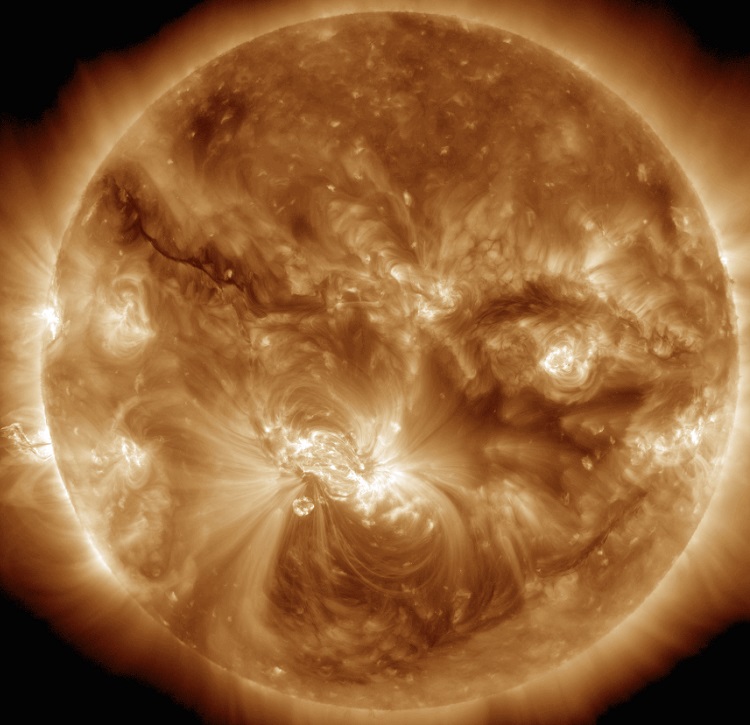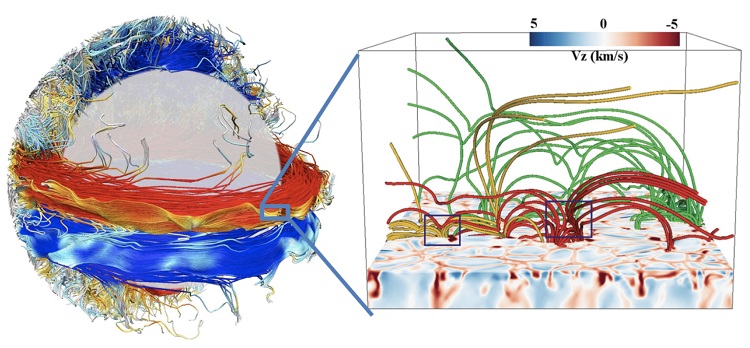St Andrews awarded share of €11.2 million European Research Council grant
 The University of St Andrews has been awarded a share of €11.2 million from the European Research Council’s Synergy Grants to study our brightest star, the Sun.
The University of St Andrews has been awarded a share of €11.2 million from the European Research Council’s Synergy Grants to study our brightest star, the Sun.
The Whole Sun Project is a synergy grant shared between the University of St Andrews, University of Paris-Saclay CEA (France), University of Oslo (Norway) and the Max Planck Institute MPS (Germany) to study the inner most workings of the Sun, from its variability, magnetic cycle and eruptive nature to how it impacts the Sun-Earth connection.
The European Research Council (ERC) grant, which provides funding for a period of six years, brings together world-leading solar and stellar physicists to build a deeper understanding of our brightest star and its twins. The University of St Andrews will receive around €2 million of funding from the grant.
The European-wide research team will purchase a supercomputer, to be hosted by the CEA (The French Alternative Energies and Atomic Energy Commission), as part of the study to develop a new global solar code and to analyse data and findings. The project partners will share use of the super-computing facilities equally for the duration of the research.
Previous research studies of the Sun have been split into internal and external solar physics topics; a global integrated view of its complex plasma dynamics has been lacking. For instance, dynamo simulations seeking to answer the origin of the magnetic field and of its cyclic behaviour neglect surface physics and the existence of sunspots, likewise surface models often assume the magnetic field as a given input without the detailed knowledge of the nonlinear interplay between convection, rotation and magnetic fields in the Sun’s outer envelope.
The Whole Sun research project will address issues such as the highly disparate spatial and temporal scales, physical interfaces of all solar layers, complex microphysics and global effects, strong dynamics and how parameters such as the star’s metallicity, mass and rotation influence the outcome, using advanced numerical simulations and high-resolution observations.

Lead researcher, Dr Vasilis Archontis, Royal Society Research Fellow at the University of St Andrews School of Mathematics and Statistics, said: “By gathering physicists from each side of the solar surface, the European-wide research group will tackle these challenges and problems by developing a deep theoretical understanding of our star and its analogues and by building the most advanced multi-resolution solar code, to jointly address global/macrophysics and local/microphysics aspects of the solar dynamics. The advent of Exa-scale computers, which can carry out a billion billion calculations per second, makes such a challenge within our reach, as do modern analysis methods to interpret observations and the 4-D data cubes that the project will produce or access.”
Twenty-seven research groups across Europe have won ERC Synergy Grants in the first competition after the reintroduction of this funding scheme, last piloted in 2013. The highly-coveted grants, worth in total €250 million, enable groups of two to four lead researchers to bring together complementary skills, knowledge and resources to jointly address research problems at the frontiers of knowledge. The grants are part of the EU’s research and innovation programme, Horizon 2020.
Demand for these grants was high: 295 research proposals were evaluated, of which 9% were selected for funding. The grant will allow creation of jobs for postdocs and PhD students, and other staff could be employed in the grantees’ research teams.
Carlos Moedas, European Commissioner for Research, Science and Innovation, said: “Synergy is a quintessential European concept: making the total effect greater than the sum of individual elements. The purpose of this EU funding is to group together top scientific talents and bring out their best. It equips researchers on their quest to put European science on the global stage and make discoveries that will ultimately improve Europeans lives.”
President of the ERC, Professor Jean-Pierre Bourguignon, commented: “Relaunching the Synergy Grants was a bold step by the ERC Scientific Council to show its commitment to more interdisciplinary research. The projects selected represent truly daring ideas put forward by some of Europe’s top scientists. The ERC is proud to provide significant help in the pursuit of such ambitious research with great potential to achieve major advances at the frontiers of knowledge.”
Category Research